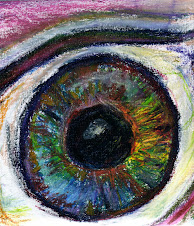In my opinion, one of the most common reasons that parents and teachers don't bring their children to the optometrist when they first start having trouble learning to read is that the grown-ups don't ask the children the right questions. So, they never hear what the child is really experiencing.
The adults who probably learned to read early and always performed at the top of the top reading group when they were in grade school often declare that the reason a child is struggling to read is that they are just lazy, do not want to work, don't pay attention, or don't want to learn.
Why don't the well-meaning but demotivating dissing grown-ups ask the child a simple question like: what makes reading hard or frustrating?
Instead of trying to put words in the child's mouth, the next thing to do is wait quietly until the child answers.
Perhaps the child will say that they can't tell where the letters are because the lines are always moving or they are on top of each other or look too blurry to read. Maybe the child will say that reading always gives them a headache. Any of these answers should send you to the optometrist immediately. They are classic symptoms of a binocular dysfunction like a convergence insufficiency. Research indicates that most patients diagnosed with convergence insufficiency resolve the problem after an average of twelve weeks of in-office vision therapy.
Other children may say that they keep losing their place when trying to read which may indicate a deficit of their eye movement skills. This condition, which is often accompanied and/or masked by a diagnosis of AD(H)D, can also be addressed by some guided vision therapy activities (And, if I do say so myself, by the activities in The Purple Book of the Eye Can Too! Read Series that I wrote- but that is shameless self-promotion, after all, so hurry and click on the link to that sale page.) Seriously, not being able to control their own eye movements is a common reason that otherwise healthy, obviously intelligent and articulate children do poorly in school.
Finally, the child may say that reading is confusing or they can't remember how to figure out the words. These answers should prompt you to have your optometrist schedule a developmental evaluation of the child's visual perceptual skills (And check out the other two books in the Eye Can Too! Read Series. The Yellow Book provides activities to improve dyslexia-like symptoms and The Green Book provides activities that rely on visual perceptual or processing skills.)
But, whether you buy my books or never look at them ever, take the advice of this mother of seven, grandmother, master teacher, and optometric vision therapist, please.
Children want to please there parents and teachers for the most part but when they don't know how to tell you why they are struggling and when you don't ask the right questions, they can only respond by resisting, refusing to cooperate, getting angry, or passively avoiding the dreaded school work.
Ask what makes it hard.
Don't put words in their mouth.
Respect their answers.
Believe what they say.
Be their best advocate.
Find real help and keep hunting if the first helper turns out not to work after all.
If you still don't know how to help your child or student, why not post your question or tweet it or Facebook it to the Eye Can Too! Read page's wall - I'll try to put in my two cents but I'll bet that the optometrists, vision therapists, parents, and educators among us will weigh in.
On behalf of all the children who went to bed tonight angry and confused about why reading is hard for them, thank you for reading this.
Thursday, September 17, 2009
Find out why a child is a struggling reader by asking the right question
Subscribe to:
Post Comments (Atom)





No comments:
Post a Comment